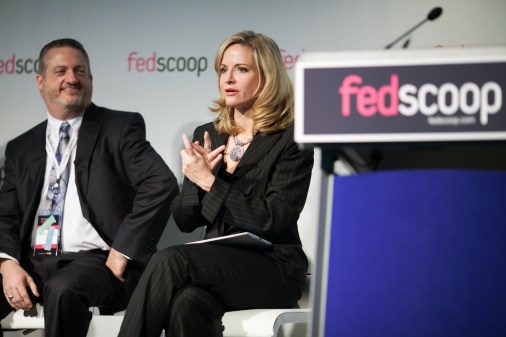CIOs turn focus to business outcomes and mission
Federal chief information officers are becoming less concerned with the specifics of their offices’ IT performance and more focused on achieving their agencies’ greater missions, a pair of CIOs said Wednesday.
Speaking on a panel at Brocade Federal Forum 2015, produced by FedScoop, Richard McKinney, CIO at the Transportation Department, and Steve Cooper, CIO of the Commerce Department, discussed how evolving IT systems — what Brocade referred to throughout the day as the “New IP” — could ease CIOs’ operations and maintenance burden, freeing them up to focus more on aligning IT with agencies’ business needs.
At DOT, McKinney said IT has become so siloed and needlessly complex that he said his job is like that of a firefighter: “We’re constantly putting out fires because our legacy construct requires that,” he told the audience.
Since taking over the department CIO role in 2013, he’s been working to reimagine that.
“How can we get ourselves out of the IT business?” McKinney said. “The CIOs could sit down with the business units and begin to imagine what the future is like and quit being firefighters. We don’t do IT for IT’s sake — we do it for a business outcome.”
During his earlier keynote, federal CIO Tony Scott discussed the benefits of using metrics to hold agencies accountable. Commerce’s Cooper, though, wasn’t a fan of looking at IT metrics. Rather, he wants his office’s IT to be assessed for how it helps achieve the department’s overall missions.
“I really don’t care that much about all the normal metrics of IT performance,” he said. “Think of the Department of Commerce. Our entire missions are about enhancing American business and technology around the globe, so why shouldn’t I be held accountable for an increase in the number of jobs in America? It’s a business metric. I’m a CIO. I’m not the IT guy. I don’t care about IT metrics; hold me accountable to business metrics.”
McKinney said in some ways the inverse is becoming true as well — more business units are becoming responsible for the development and modernization of IT.
“Technology is now embedded in almost everything we do,” he said. “And each of us has a role to play in having a successful outcome.”
For instance, thanks to the new passage of Federal Information Technology Acquisition Reform Act, budgeting officials now have to work more closely with the CIO on IT efforts. Likewise, procurement officials are responsible for assisting CIO offices in most effectively acquiring what they need.
Soraya Correa, chief procurement officer at the Department of Homeland Security, said during the panel that her job is “to partner with the IT community and make sure that we’re delivering good solutions together.” Correa said she and DHS CIO Luke McCormack meet regularly to talk about what he needs or envisions and how she can help him obtain it. The end goal, she said, is “getting us to be smarter, better and faster at what we do and what we buy.”
Even chief human capital officers have a stake in agencies’ IT, the DOT CIO said.
“IT is a team sport, and who’s on your team and how they’re trained and how they’re compensated and how they’re retained and how they’re attracted is going to have an impact on the outcome” of IT, McKinney said. “We’re all looking in each other’s eyes and realizing the successful implementation of information technology in this department is a joint responsibility.”
McKinney said “there’s a perfect storm going on right now,” referring to the passage of FITARA, the recent cyber breaches, the proliferation of cloud and how that all places added emphasis on IT in agencies’ missions.
“If we bring all those things together and reimagine where we could be, we could drive down our [operational expenditures], drive up our modernization efforts, and we could begin to have a conversation with the business units about ‘Where are you going and how can we serve you?'” he said.
Additional reporting from the Federal Forum 2015:
Government needs agile networks, federal CIOs say – At Brocade’s Federal Forum, produced by FedScoop, IT leaders emphasized the need for flexible computing networks as the U.S. faces a mounting cyber threats.
Federal IT isn’t keeping up with new technology – Brocade CEO – CEO Lloyd Carney argues the federal government must modernize its legacy IT systems to create stronger defenses against countries using newer technologies.
How the ‘New IP’ can help federal agencies –Brocade said federal agencies that use software-defined networks will get the fast and flexible systems that they have wanted for years.
Tony Scott’s plan for restoring confidence in federal cybersecurity – The new U.S. chief information officer outlined his strategy for improving the government’s cybersecurity posture — faster, newer, better.
Agencies using hybrid clouds need orchestration tools – As agencies expand their IT into multiple clouds, the need for a single, open source orchestration platform is becoming more crucial, a cloud expert argues.
Federal, industry leaders recognized for ‘Breaking the Status Quo’ – At Brocade’s 2015 Federal Forum, four federal and industry leaders were recognized for their innovative work in government information technology.






